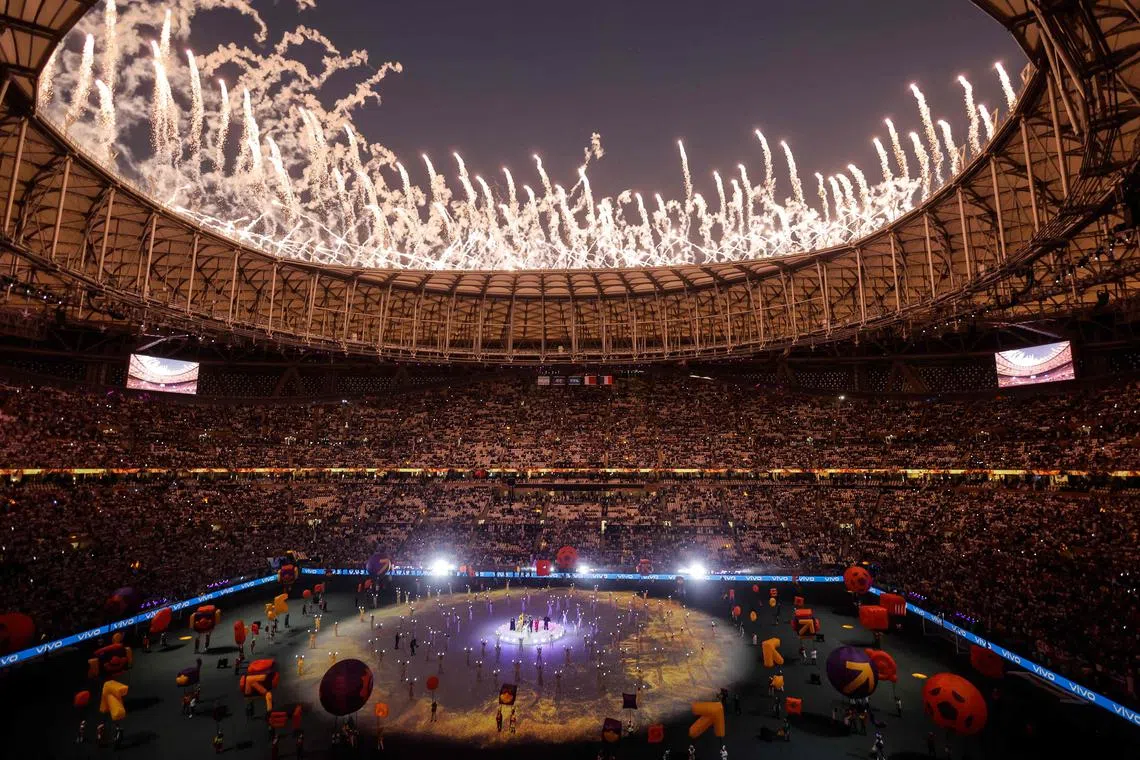World Cup: Question marks remain over legacy of Qatar 2022
Sign up now: Get ST's newsletters delivered to your inbox

Fireworks go off as artists perform during the closing ceremony of the Qatar 2022 World Cup ahead of the football final match between Argentina and France on Sunday.
PHOTO: AFP
Follow topic:
DOHA – Is Fifa president Gianni Infantino right? Has the World Cup in Qatar been its best edition yet, “a real incredible success on all fronts” as he gushed on Friday?
As the curtain came down on the month-long event with Sunday’s final
One incontestable fact is it certainly has been the most expensive, with spending reportedly reaching US$220 billion (S$302 billion), over US$200 billion more than the next highest, Brazil 2014.
A lot of this expenditure was for infrastructural upgrades, with the price of building or upgrading stadiums US$6.5 billion and a spanking new, efficient metro system – which proved a boon for visitors – costing US$36 billion.
At a time when most nations have shunned exorbitant budgets for major sports events due to costs – partly why the next World Cup in 2026
The question is, was it money well spent?
Perhaps, given this tiny Gulf nation’s ambition of establishing itself as a hub for major sports events.
One of the most immediate and persistent criticisms against Qatar 2022 was the desert heat and how it would affect visitors and athletes. That, the organisers solved by firstly moving the event to a “winter” World Cup and secondly by air-conditioning the stadiums.
Heat issue solved, it is no wonder that Qatar – a young nation that gained independence just six years after Singapore – which has hosted the Asian Games (2006), a Formula One grand prix (2021) and with the World Cup now delivered, is dreaming of a bid for the 2036 Olympics.
The lessons learnt over the past month will put it in good stead.
While Qatar’s hardware has been lauded, its “software” – handling of organisational and social issues – has not received universal acclaim, particularly early on as it grappled with an event of this scale for the first time.
But the complaints soon quietened and creases in operations ironed out, and they made way for videos on social media of smiling police officers and locals helping visiting fans put on ghutras (the traditional Arab headdress).
An 11th-hour U-turn on allowing alcohol to be consumed in stadiums
Yet, the ban on beer did not appear to have any impact on fans’ enjoyment of games. In fact, the BBC reported that a number of female fans from all over the world felt safer without booze in the stands.
Mark Roberts, head of the UK Football Policing Unit, also said in a report after Wales and England were eliminated that he believed strict laws on alcohol sales in Qatar contributed to zero arrests at a World Cup for the first time since the unit was formed in 2005.
Things were less clear-cut though when it came to Qatar’s human rights record, its laws criminalising homosexuality and treatment of migrant workers.
Midway through the tournament, Hassan al-Thawadi, secretary-general of Qatar’s Supreme Committee for Delivery and Legacy (SC), admitted in a TV interview that the toll of migrant workers who died on World Cup-related projects since 2010 is “between 400 and 500”.
The SC previously said there were only three work-related fatalities and 37 non-work-related deaths among migrant workers involved in building the stadiums.
The revelation was a blow for the organisers, even as they continued to battle allegations of sportswashing and bribery for the hosting rights.
These controversies have meant the 2022 Cup was one of the most political in recent history. There was the OneLove armband controversy – leading to the iconic image of the German team covering their mouths in protests against Fifa during their team photo – while various teams spoke out in different ways.
England took a knee before each kick-off while Iran’s players refused to sing their national anthem, in solidarity with anti-government protesters in Teheran streets following the death of a young woman while in the custody of the country’s morality police.
Sobering incidents involving loss of life also occurred in Qatar. Prominent American journalist Grant Wahl died after suffering a ruptured blood vessel
Against such a backdrop, Infantino’s comments on Friday are overly optimistic. But he and football’s governing body have long prioritised the action on the field – and the billions of dollars it generates – above all else.
Unsurprisingly, 64 matches aided by the star power of Lionel Messi, Kylian Mbappe, Cristiano Ronaldo and Neymar have generated plenty of top-class distractions.
However, Morocco’s dream run to the semi-finals
That a representative from every continent made the knockout rounds – for the first time – also enhanced the impression of a growing democracy in international football, a narrative no doubt useful for Fifa as it prepares for a record 48 teams at the next edition.
And so as the sun sets over the desert here, what will we remember of the 22nd World Cup? Spectacular goals perhaps, a familiar world champion in the record books and maybe even some of the PR snafus from Infantino, Fifa and Qatar itself.
Then back to the wheel again. Onward to North America, and potentially another “best-ever” World Cup, we go.


